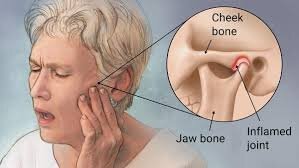How to Help Your TMJ Discomfort
TMJ
TMJ is estimated to affect 10 million Americans. A TMJ is more than just clicking or popping of the jaw. In fact, unless you experience pain with any clicking or popping it is completely normal to have clicking and popping of the TMJ.
What exactly is considered a temporomandibular joint (TMJ) disorder? When do you need to seek help? Our goal is to help explain what the TMJ is, what some causes are of TMJ disorders, what the signs and symptoms are, and what type of treatment is available.
The temporomandibular joint (TMJ) is where the lower jaw is connected to the skull. TMJ disorders can go unnoticed if you are unaware what contributes to a TMJ disorder. Things such as, jaw clenching and teeth grinding can overwork the joint causing the disc in the joint to wear down or even displace.
People do not typically realize they are clenching or grinding as many people do it in their sleep or unconsciously throughout the day. It is important if you notice yourself doing either that you make an effort to relax the jaw.
There are a wide variety of symptoms that indicate a person has a TMJ disorder. These include but are not limited to
Pain in the facial muscles, jaw joints, or around the ear. This can be painful when talking, chewing or yawning
Difficulty chewing or biting
Headaches, dizziness, ear pain, hearing loss, and ringing in the ears
Jaw locking, either wide open or locked shut
Popping and clicking of the joint that causes pain or discomfort
If you or your child have any of these symptoms always call your dentist to set up a consult. Your provider will be able to come up with a treatment plan to best fit your needs.
Once the joint is strained it can be easily re-injured (like a sprained ankle which is subsequently more prone to injury).The following suggestions will help:
Apply moist heat for 20 min two to four times each day or use ice wrapped in a thin washcloth for 10 min two to four times each day( whichever feels best)
Eat a softer diet
Place your tongue to the roof of your mouth and separate your teeth to maintain the jaw in a relaxed comfortable position
Avoid caffeine as caffeine is a muscle contracture
Avoid resting your jaw on your hand
Avoid stomach sleeping since this puts adverse forces on the jaw and neck muscles
Use anti-inflammatory and pain reducing medications like Ibuprofen, Tylenol, or Aspirin
Braces and TMJ
Whatever your age, braces are incredibly beneficial for a variety of problems like TMJ. Learn more in this informative blog!
Stopping Tooth Sensitivity and Gum Recession
If your gum tissue keeps receding, than this blog is for you! Protect your enamel and the gums that surround them with these helpful tips.
The Need For X-rays
Think x-rays aren’t important? Think again! Here’s why updated x-rays are necessary at your annual visit.
Cited Sources
“TMJ Disorders (for Parents).” Edited by Kenneth H. Hirsch, KidsHealth, The Nemours Foundation, July 2015, https://kidshealth.org/en/parents/tmj.html.
“PDF.” Sept. 2017. https://www.nidcr.nih.gov/sites/default/files/2017-12/tmj-disorders.pdf

